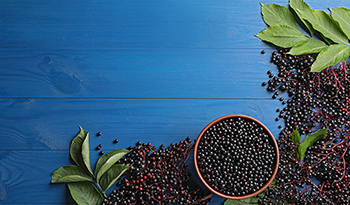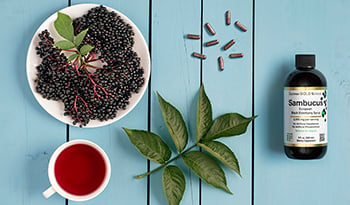Flu Season Kit For Immune Health: 7 Vitamin Essentials
When cold and flu season comes around, it is important to reduce your risk of infection and bolster your immune system. Here are some basic tips to keep in mind:
- Wash your hands frequently.
- Avoid touching your face (or at least wash your hands beforehand).
- Avoid close contact with sick people (keeping a distance of at least 6 feet).
- Carry hand sanitizer for those times when soap and water are not nearby. The CDC (The Centers for Disease Control and Prevention) recommends an alcohol content of at least 60%.
- Speak with your healthcare provider to determine if the flu vaccine is appropriate for you.
Beyond these general recommendations, key lifestyle, dietary, and supplement strategies can improve the odds of getting through the cold and flu season unscathed. Just as you would keep a first aid kit in your home for emergency purposes, you should also put together a “flu season kit.” You can start using this kit right away so your immune system is prepared when cold and flu season arrives.
Flu Season Vitamin Essentials
The health of the immune system is greatly influenced by nutritional status. An overwhelming amount of research data indicates that any nutrient deficiency can profoundly impair the immune system.3
Unfortunately, nutrient deficiency, especially for vitamins and minerals essential to a well-functioning immune system is common. In the latest analysis from National Health and Nutrition Examination Surveys (NHANES) in the United States, it was found inadequate intakes of many critical nutrients for the immune system such as vitamin D3 (95%), vitamin E (84%), vitamin C (46%), vitamin A (45%), and zinc (15%).4
To ensure you are prepared for cold and flu season, stock up on these essentials.
1. Multivitamin
The first essential in your flu season kit is a high-potency multiple vitamin and mineral supplement that provides the recommended daily allowance (RDA) of these essential nutrients.
A multiple vitamin and mineral formula acts as a nutritional “insurance policy” that sufficient levels of key nutrients for immune function are being ingested. This dietary supplement should become part of your daily program year-round.
Here is what you should have in your multivitamin for immune-boosting benefits:
- Vitamin A is essential for maintaining skin and mucous membranes, which serve as the first defense against infection. It's also crucial for white blood cell function and boosts the immune system's activities, including thymus function, tumor-fighting, and antibody response.
- B vitamins, especially B1, B6, and B12, are required for making disease-fighting antibodies. In addition, B vitamins are essential to normal cell division. Therefore, low levels of B vitamins impair your body’s ability to make new white blood cells.
- Vitamin C activates white blood cells to attack intruders, boosts antibody levels, supports hormone secretion from the thymus, and enhances interferon, the body’s antiviral compound. During an infection or stress, your need for vitamin C increases.
- Vitamin D3 is crucial for guarding against viral or bacterial upper respiratory infections. It enhances immunity and can reduce the frequency of these infections. Many health experts recommend taking 2,000-5,000 IU of vitamin D3 daily, in addition to what's in a multivitamin, to support immune function.
- Zinc plays a crucial role in immune function. When zinc is low, white blood cell counts drop, thymus hormone levels fall, enzyme activity decreases, and some white blood cell functions shut down.
- Selenium is involved in antioxidant mechanisms that protect the thymus gland. People who are low in selenium have reduced immunity and lower antibody levels.
2. Vitamin D3
Vitamin D3 is vital for immune health, yet about 70% of Americans lack sufficient levels. Those with a deficiency are more vulnerable to viral infections. Fortunately, taking D3 supplements can boost the immune system's defense against infection.
In a detailed analysis published in the British Medical Journal, vitamin D3 supplementation produced a 70% decrease in all respiratory infections in those with D3 insufficiency and those with good levels of D3 experienced a 25% reduction in respiratory infections.5
Taking an extra 2,000 to 5,000 IU of D3 daily to achieve and maintain optimal blood levels of D3 is recommended by many vitamin D3 medical experts. This dosage is universally regarded as safe.
3. Probiotics
Probiotics are beneficial bacteria that humans get by ingesting certain types of fermented foods or dietary supplements. Probiotic supplementation is supported by significant clinical research with nearly 1,000 human double-blind, placebo-controlled studies. Much of the research has focused on probiotics to support immune function and promote gastrointestinal health.6
A probiotic supplement should be used on an ongoing basis. Use well-respected brands and follow label instructions.
4. Beta-Glucan
Beta-glucans are fiber-type polysaccharides found in various sources. The beta-glucan of yeast, especially baker’s yeast (Saccharomyces cerevisiae), has been extensively studied in numerous preclinical and clinical studies. In short, beta-glucans prompt certain white blood cells to destroy viruses and other organisms. White blood cells have receptor sites on their surfaces for yeast beta-glucans. Like a lock opened by the right key, these sites are specific to the beta-glucan's structure. When yeast beta-glucan binds to the receptor, it activates white blood cells to help fight invading organisms.
Yeast beta-glucan has proven effective in boosting immune function in over 30 clinical trials. The clinical results from double-blind studies with yeast beta-glucan at a dosage of 500 mg daily have shown many effects useful in promoting health and fighting off cold and flu symptoms. In one of the most impressive studies not one participant in the beta-glucan subject group missed a day of work or school due to cold symptoms. In contrast, subjects in the placebo group missed an overage of 1.38 days during the trial. Additionally, while 3.5 participants in the placebo group had an incidence of a fever, there were 0 fever incidences in the beta-glucan group. Beta-glucan supplementation also had a great effect in improving quality of life, physical energy, and overall well-being.7
A beta-glucan supplement is best used to support immune function during the cold and flu season as well as in an active upper respiratory tract infection.
5. Vitamin C
Many claims have been made about the role of vitamin C (ascorbic acid) in the prevention and treatment of the common cold. To date, there have been over 30 clinical trials involving 11,350 study participants to judge the effectiveness of vitamin C in preventing or treating the common cold. The results of a very detailed analysis of these studies concluded that taking a vitamin C supplement can be quite beneficial in reducing the risk of developing a cold in high-stress situations, and it may also reduce the duration of a cold by a day or so. For instance, in six trials involving a total of 642 marathon runners, skiers, and soldiers on sub-arctic exercises, the risk of developing a cold was reduced by 50% in the vitamin C group compared to a placebo.
There are lots of options in capsules, gummies, liposomal forms, and powdered drink mixes. In particular, liposomal forms are becoming very popular due to improved absorption with fewer gastrointestinal side effects (gas and loose bowel movements). During acute stress or an infection, take 1,000 mg of liposomal vitamin C twice daily.
6. Zinc Lozenges
One of the most popular natural approaches to help with common cold symptoms is the use of zinc lozenges. Many clinical studies have shown that zinc lozenges provide relief for a sore throat due to the common cold,9 but there are some important guidelines to follow:
- Use lozenges supplying 15–25 mg of elemental zinc.
- Dissolve in the mouth every two waking hours after an initial double dose.
- Try to take 75 mg of zinc in a 24-hour period, but no more than this amount and for no longer than 7 days
7. Elderberry
Elderberries have been a part of traditional approaches to improving health throughout the world. Elderberry dietary supplements are now a popular approach in supporting immune function during a cold or flu. Elderberries and their components have been the subject of nearly 6,000 studies published in the scientific literature. These studies show black elderberry supports immune function and exerts beneficial actions if used at the onset of upper respiratory symptoms due to the common cold.10
The European black elderberry (Sambucus nigra) is regarded as the most beneficial of the elderberries primarily due to its higher level of pigments known as anthocyanins responsible for its deep, dark purple color. Black elderberry preparations are available as a syrup, liquid, or in capsules, tablets, or gummies. Follow label instructions.
Best Foods For Flu Season
Optimal immune function, especially during cold and flu season, requires a healthy diet:
- Rich in whole, natural (preferably organic) foods, such as fruits, vegetables, whole grains, beans, seeds, and nuts
- Low in fats and refined sugars
- Contains adequate, but not excessive, amounts of protein.
- Five or six 8-ounce glasses of water per day.
Some of the most important foods to enhance immune function are the carotenoids. Foods high in carotenoids include darkly colored vegetables, such as dark green leafy vegetables; yellow and orange squash, carrots, yams, and sweet potatoes; and green and red peppers. Studies back in the 1930s showed that the higher a child’s carotenoid intake the fewer the number of school days missed due to infections.1 More recent research has documented that carotenoids enhance many aspects of immune function.2
Learn more about the best foods to eat when sick and what to avoid.
Lifestyle Tips To Boost Immune Health
To have an optimally functioning immune system requires a health-promoting lifestyle. Meaning getting enough quality sleep (at least seven hours each night), getting regular physical exercise, avoiding harmful health habits like smoking and excessive alcohol consumption, and following an effective stress management program that includes deep breathing exercises, meditation, or prayer.
The immune system is sensitive to these lifestyle factors. Stress, lack of quality sleep, excessive alcohol intake, and smoking can all be contributors to impaired immune function and increased susceptibility to colds and infections.
References:
- Clausen SW. Carotenemia and resistance to infection. Trans Am Pediatr Soc 1931; 43:27–30.
- Toti E, Chen CO, Palmery M, Villaño Valencia D, Peluso I. Non-Provitamin A and Provitamin A Carotenoids as Immunomodulators: Recommended Dietary Allowance, Therapeutic Index, or Personalized Nutrition? Oxid Med Cell Longev. 2018 May 9;2018:4637861.
- Reider CA, Chung RY, Devarshi PP, et al. Inadequacy of Immune Health Nutrients: Intakes in US Adults, the 2005-2016 NHANES. Nutrients. 2020;12(6):1735.
- Gombart AF, Pierre A, Maggini S. A Review of Micronutrients and the Immune System-Working in Harmony to Reduce the Risk of Infection. Nutrients. 2020;12(1):236.
- Martineau Adrian R, Jolliffe David A, et al. Vitamin D supplementation to prevent acute respiratory tract infections: systematic review and meta-analysis of individual participant data. BMJ 2017;356:i6583.
- Pramanik S, Venkatraman S, Karthik P, Vaidyanathan VK. A systematic review on selection characterization and implementation of probiotics in human health. Food Sci Biotechnol. 2023 Jan 10;32(4):423-440.
- Zhong K, Liu Z, Lu Y, Xu X. Effects of yeast β-glucans for the prevention and treatment of upper respiratory tract infection in healthy subjects: a systematic review and meta-analysis. Eur J Nutr. 2021 Dec;60(8):4175-4187.
- Hemilä H, Chalker E. Vitamin C for preventing and treating the common cold. Cochrane Database Syst Rev. 2013;2013(1):CD000980.
- Hunter J, Arentz S, Goldenberg J, et al. Zinc for the prevention or treatment of acute viral respiratory tract infections in adults: a rapid systematic review and meta-analysis of randomised controlled trials. BMJ Open. 2021;11(11):e047474.
- Mocanu ML, Amariei S. Elderberries-A Source of Bioactive Compounds with Antiviral Action. Plants (Basel). 2022 Mar 10;11(6):740.
DISCLAIMER:This Wellness Hub does not intend to provide diagnosis...
















































































 Table of Contents
Table of Contents















